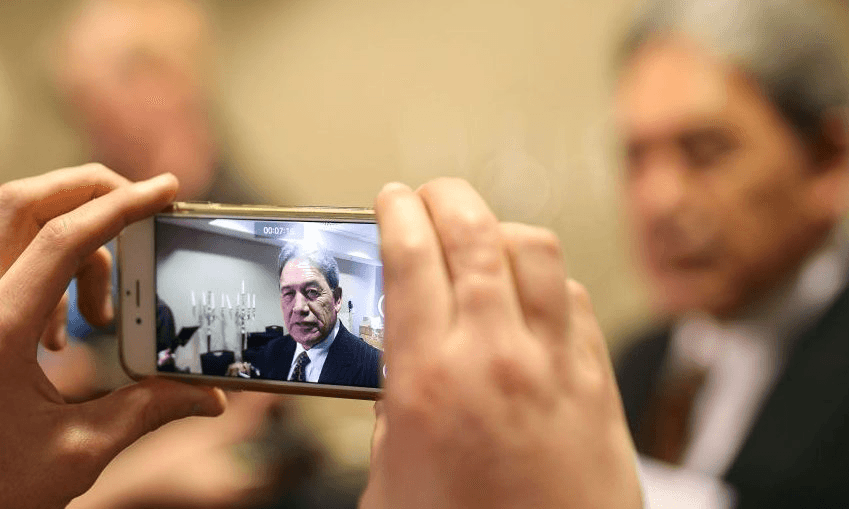Close to invisible since the election, the NZ First leader addressed loyal party members yesterday with a catalogue of old classics.
On the evening of October 17, 2020, as it became clear the miracle had refused to happen, Winston Peters spoke to New Zealand First supporters then slipped out of the Duke of Marlborough hotel in Russell. One of the most visible and polarising figures in New Zealand politics across more than four decades – pantomime villain, kingmaker, deputy prime minister – he has barely been seen since. There was a farewell at parliament, but even that was cloaked in mystery.
Yesterday, Winston returned, delivering the keynote at the New Zealand First convention. And I for one was excited. Not excited enough to traipse across town to the Highbrook Convention Suites in the rain. But excited enough to watch the livestream.
New Zealand First’s election failure came in the year of its 27th birthday, and it was tempting to wonder if the party was joining the infamous 27 club. In his speech, Peters was swift to swat away any such morbid thoughts, and the dastardly media with them.
“So many critics and scribes have tried, and continue, to write our obituary. But we are here today, as always, steadfast and resolved to put New Zealand first,” went his opening remarks. “We are a phoenix that will again arise as the public wake up to the inexactitude of this government and a hapless National Party,” he said, before rousing the party faithful with 19th century poetry.
“You here today define the second verse of Henley’s poem ‘Invictus’,” he said. “To paraphrase: ‘In the fell clutch of circumstance / We have not winced nor cried aloud. / Under the bludgeonings of chance / Our heads are bloody, but unbowed’.”
And what was the cause to which we (he’d changed the pronouns from I/my to we/our) must rise? Peters was most consumed, it seemed, by the use of the name Aotearoa and other te reo Māori in government. It was, he thundered, the work of a “haughty autocracy“, a “name change cult”.
The Peters jukebox then rattled through the targets. The “ngāti woke” who buy electric cars. Cyclists. Ihumātao. John Key. Gang members. “Māori separatism.” He said: “Growing in our country is a ‘cancel culture’ where anyone who asks legitimate questions is belittled as a colonialist, a racist, a bigot, a chauvinist, or worse still, not new wokeage.” No, me neither.
He waxed lyrical about the “the 1950s and 1960s when we were a world economic performance leader”. Coronation Street got a shout out. And with every second breath he lambasted the evilest machine of them all: the media.
While he was withering about the Greens and James Shaw, about the National Party and Judith Collins, Peters steered well clear of any personal jabs at Jacinda Ardern. While Labour might have failed on delivery, “We are not challenging the prime minister’s good intentions and her crisis leadership.”
Naturally, Peters reached for the handbrake. Of NZ First’s time in coalition, he said: “We held firm to get things done and be a handbrake on things that should not be done.” What he didn’t do was speak to the moment. He didn’t make the argument how and why New Zealand would be better today if his party sat around the cabinet table. Would that not play better with the proverbial “middle New Zealand” than yet more shouting at the separatism clouds?
Call it the centre ground, the median voter, or whatever; it will suit Labour strategists down to the ground to see that territory so often ignored, while Act and National, and the husk of New Zealand First play duelling dog whistles.
Even the most loyal of the party didn’t seem that fired up by the old tunes. “We’re coming back because we believe we can,” concluded Peters. “So let’s ensure they all hear it. Ready? We are coming back!” Peters exhorted the room to join him chanting. “We are coming back,” he said again, and they did their best. He said: “I want them to hear it in downtown Queen Street.” I’m not sure they’d have heard it in the next room.
Peters didn’t quite get to the pressing question on the minds of many, however: will you be coming back? That was the demand at least of a gentleman who walked among the tables to applause as Peters finished the speech, holding aloft a large sheet of card emblazoned with “BRING BACK WINSTON”, a little red heart marking the dot above the I.
The man’s name is Craig Sinclair, and he was the guy who achieved brief notoriety for the “SHE’S A PRETTY COMMUNIST” placard he took to a Jacinda Ardern speech in Morrinsville during the 2017 campaign. He was already developing his theme then. As Spinoff correspondent Simon Wilson reported on the day: “On the other side it read, ‘BRING BACK BUCK AND WINSTON’.”
The man with the sign didn’t get an answer on Peters’ personal plans. Probably because Peters isn’t yet sure himself. He’ll be 78 at the next election. Even the most robust of phoenixes must grow tired of all those ashes at some point. In the meantime, this didn’t feel so much a comeback speech as classic hits karaoke.
Follow The Spinoff’s politics podcast Gone By Lunchtime on Apple Podcasts, Spotify or your favourite podcast provider.

